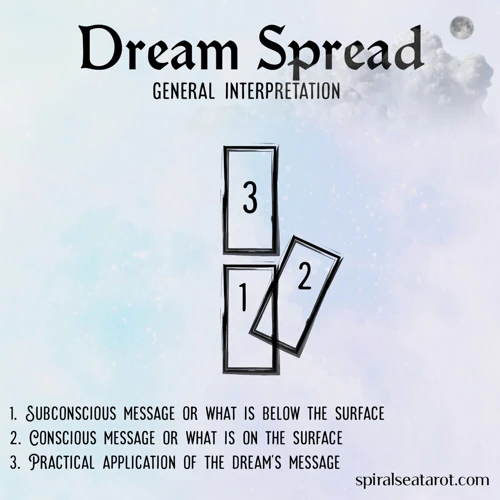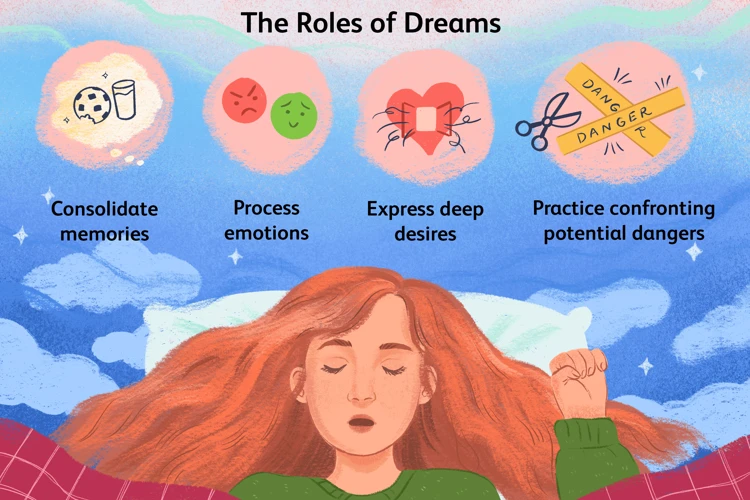Unveiling the Hidden Messages in Recurring Dreams: Decoding the Enigmatic Realm of the Subconscious Mind
Have you ever found yourself waking up in the middle of the night, drenched in sweat, after experiencing yet another recurring dream? These puzzling nighttime adventures have long fascinated both scientists and dream enthusiasts alike. Recurring dreams, with their elusive meanings and mysterious symbolism, offer a captivating window into our subconscious mind. In this article, we will delve into the depths of these enigmatic dreams, exploring their definition, frequency, and common themes. We will also embark on a journey of interpretation, uncovering hidden symbols and personalized meanings. We will discuss the potential messages these dreams may hold, from unresolved issues in our lives to warning signs and hidden desires. Along the way, we will explore the role of the subconscious mind and the impact of repressed emotions and trauma. Discover how recurring dreams can serve as powerful tools for self-reflection and growth, as well as methods for decoding and exploring their hidden messages. From lucid dreaming techniques to dream analysis, get ready to unravel the secrets of your most perplexing recurring dreams.
Understanding Recurring Dreams

Recurring dreams, those perplexing nocturnal adventures that seem to haunt us night after night, hold a deep fascination for both dream enthusiasts and scientists alike. Understanding recurring dreams is the key to unlocking the hidden messages they contain. These dreams, by definition, are dreams that reoccur consistently over a period of time. They often feature common themes and symbols that can provide valuable insights into our subconscious mind. Exploring the frequency and common themes of these dreams can offer clues to their significance. By analyzing the repetitive nature of these dreams, we can begin to unravel the deeper meanings they hold. To delve further into the realm of recurring dreams and their symbols, you can refer to our guide on the meaning of recurring dream symbols. Additionally, understanding the psychological perspectives on recurring dreams can shed light on the role of the subconscious mind and how repressed emotions and trauma can manifest in our dreams. For a more comprehensive analysis, you can explore our article on the science of recurring dreams. Through investigation and interpretation, the enigmatic world of recurring dreams can offer profound insights into our inner selves.
Definition of Recurring Dreams
Recurring dreams, as the name implies, are a unique category of dreams that possess a distinctive characteristic: they occur repeatedly over a prolonged period of time. Unlike ordinary dreams that come and go without recurrence, recurring dreams persist, resurfacing with a frequency that sets them apart. It is this persistent nature that captivates dream researchers and individuals alike, as it raises questions about their significance and hidden meanings. These dreams can encompass a wide range of subjects, from mundane scenarios to bizarre and fantastical experiences. While the content and context of recurring dreams may vary from person to person, one common feature unites them all: repetition. This repetition can manifest in various ways, with the same dream narrative playing out like a recurring episode or a set of similar themes reappearing across multiple dreams. To further explore the intricacies of recurring dreams and their underlying mechanisms, you can refer to our comprehensive article on the science of recurring dreams. Understanding the definition of recurring dreams sets the stage for unraveling their mysteries and delving into their potential messages.
Frequency and Common Themes
When it comes to understanding recurring dreams, examining their frequency and common themes is crucial. Recurring dreams tend to appear repeatedly over a period of time, often leaving a lasting impression on our subconscious minds. The frequency of these dreams can vary from person to person, with some experiencing them every week, while others might have them once a month or even less frequently. By keeping a dream journal and noting the occurrence of these dreams, we can gain a better understanding of their regularity and patterns.
In addition to frequency, common themes play a significant role in decoding recurring dreams. These themes can involve a wide range of elements, such as water, flying, falling, being chased, or being unprepared for an exam. While the specific symbols and scenarios may differ from person to person, certain recurring themes tend to be more prevalent. For instance, dreams about being chased or falling are commonly reported by individuals around the world. These themes may reflect feelings of anxiety, insecurity, or a sense of being overwhelmed in waking life. Exploring the underlying emotions and situations associated with these common themes can provide valuable insights into their meaning and significance.
To illustrate the frequency and common themes of recurring dreams, here is a breakdown in a table format:
| Recurring Dream Theme | Frequency of Occurrence |
|---|---|
| Being Chased | High |
| Falling | High |
| Flying | Moderate |
| Being in School/Classroom | Moderate |
| Naked in Public | Low |
Understanding the frequency and common themes of recurring dreams can help us identify patterns and gain deeper insights into their meanings. By recognizing the prevalence of certain themes, we can begin to decode the hidden messages they hold and embark on a journey of self-discovery.
Interpreting Recurring Dream Symbols

Interpreting recurring dream symbols is akin to unlocking a secret code hidden within the depths of our subconscious mind. These symbols hold significant meaning that can provide valuable insights into our innermost thoughts, emotions, and desires. By unraveling the common symbols and their meanings found in recurring dreams, we gain a deeper understanding of the messages they convey. These symbols can be universal, such as water representing emotions or death symbolizing transformation, or they can be highly personal and unique to the dreamer. Paying attention to the personalized symbolism in recurring dreams, such as specific people, objects, or scenarios, allows us to tap into our individual subconscious language. To delve further into the interpretation of recurring dream symbols, you can refer to our comprehensive guide on the meaning of recurring dream symbols. By exploring and decoding these symbols, we gain valuable insights into our inner psyche and the messages our dreams are trying to convey.
Common Symbols and Their Meanings
When it comes to recurring dreams, common symbols often play a significant role, each carrying its own unique meanings. Understanding these symbols is essential in deciphering the messages embedded within our dreams. Here are some of the most prevalent symbols and their possible interpretations:
1. Falling: Falling in a dream is a symbol often associated with a loss of control or feeling overwhelmed in waking life. It can represent a fear of failure or the need to let go and trust the process.
2. Being Chased: Being chased in a dream can indicate avoidance or running away from a problem or situation in your waking life. It may be a manifestation of unresolved fears or anxieties that need to be confronted.
3. Water: Water is a versatile symbol that can represent emotions, intuition, and the unconscious mind. The state of the water, whether calm or turbulent, may reflect the state of your emotions or the level of clarity in your life.
4. Teeth: Dreams involving teeth are prevalent and can signify underlying anxieties about appearance, communication, or personal power. Losing teeth in a dream may suggest a feeling of vulnerability or a fear of aging.
5. Flying: Flying in a dream often symbolizes liberation, freedom, or a sense of empowerment. It can represent overcoming obstacles or gaining a new perspective on life.
6. Being Naked in Public: Dreams of being naked in public can reveal feelings of vulnerability, embarrassment, or a fear of judgment. They may signify the need for acceptance and self-confidence.
7. Animals: Animals in dreams have a variety of meanings depending on the specific animal and its behavior. For example, a dream about a snake could represent transformation or hidden fears, while a dream about a cat may symbolize independence or intuition.
Remember, dream symbolism is highly subjective and can vary based on personal experiences and cultural influences. It is important to consider the context and your own feelings when interpreting these symbols in your recurring dreams.
Personalized Symbolism in Recurring Dreams
Understanding the personalized symbolism in recurring dreams is crucial for unlocking their hidden messages and gaining deeper insight into our subconscious selves. These dreams often contain symbols and motifs that are unique to the individual experiencing them. While certain symbols may have universally recognized meanings, it is important to recognize that our personal experiences, emotions, and beliefs can infuse these symbols with personalized significance. Here are some key aspects to consider when exploring personalized symbolism in recurring dreams:
1. Reflect on Your Personal History: Look back at significant events or experiences in your life that may have left a lasting impact on your subconscious mind. These events can shape the symbolism that appears in your recurring dreams. For example, if you have a fear of water due to a childhood incident, water symbols in your dreams may represent feelings of anxiety or unease.
2. Pay Attention to Emotions: In recurring dreams, the emotions associated with specific symbols can provide valuable insights. Take note of how you feel when certain symbols or situations arise. Emotions such as fear, joy, or sadness can help decipher the personal significance of these symbols. For instance, if you consistently feel a sense of freedom and happiness when encountering birds in your dreams, it could indicate a desire for liberation or a connection to nature.
3. Analyze Context and Connections: Look beyond individual symbols and examine the overall context and connections within your recurring dreams. Pay attention to recurring themes, interactions between characters, and the progression of events. This broader analysis can unveil deeper layers of symbolism and shed light on the complex messages your subconscious is trying to convey.
4. Keep a Dream Journal: Documenting your dreams in a journal can be immensely helpful in uncovering personalized symbolism. Write down the symbols, emotions, and any associations or thoughts that come to mind. Over time, patterns and connections may emerge, providing additional clues to the personalized meanings embedded in your recurring dreams.
5. Seek Inner Reflection: Allow yourself the space for introspection and self-reflection. Through meditation, visualization, or simply quiet contemplation, connect with your inner self and explore what the symbols in your recurring dreams might represent on a deeper level. Trust your intuition and let your subconscious guide you in deciphering the personalized symbolism of your dreams.
By understanding and interpreting the personalized symbolism in recurring dreams, we can gain valuable insights into our subconscious minds and uncover hidden aspects of ourselves. Remember, these symbols hold unique meanings for each individual, and delving into their personalized significance can open a gateway to self-discovery and personal growth.
Exploring the Potential Messages

Once we begin to decode the symbols and themes within our recurring dreams, we open ourselves up to a world of potential messages and insights. These dreams often serve as reflections of our unresolved issues, providing us with an opportunity to address and confront them in our waking lives. The unresolved issues in your life that manifest in recurring dreams can act as psychological markers, guiding us towards areas that require attention and growth. Additionally, these dreams can act as warning signs and premonitions, offering guidance and foresight into potential challenges or dangers we may face. Recurring dreams can also reveal our hidden desires and ambitions, tapping into our deepest aspirations and longings. By exploring these potential messages, we embark on a journey of self-discovery and self-realization, ultimately leading us towards personal growth and transformation.
The Unresolved Issues in Your Life
Recurring dreams have a fascinating way of shining a spotlight on the unresolved issues in our lives. They serve as powerful indicators that there are lingering emotions, conflicts, or situations that require our attention and resolution. These dreams can manifest in various forms, each carrying its own symbolic message. For example, dreaming about being lost or unable to find your way may reflect a sense of directionlessness or uncertainty in your waking life. Similarly, dreams featuring unfinished tasks or unresolved conflicts with loved ones could be a sign of unresolved issues that need to be addressed. The recurring nature of these dreams underscores the urgency and importance of acknowledging and tackling these unresolved aspects head-on. While it may not always be easy to decipher the exact meaning of these dreams, paying attention to the emotions they evoke and reflecting on the circumstances in your life can provide valuable clues for finding the necessary closure. By acknowledging and actively working towards resolving these unresolved issues, you can experience a sense of relief and growth, ultimately leading to inner peace and harmony.
Warning Signs and Premonitions
When it comes to recurring dreams, certain patterns and symbols can act as warning signs or premonitions of future events. Paying attention to these ominous dream messages can potentially help us navigate challenging situations in our waking lives. It is important to approach these dreams with an open mind and a willingness to explore their deeper meaning. Here are a few common warning signs and premonitions that may arise in recurring dreams:
- Natural disasters: Dreams featuring earthquakes, floods, or tornadoes may indicate a looming sense of chaos or upheaval in our lives. They could serve as warnings to prepare for upcoming challenges and disruptions.
- Accidents: Dreams involving car crashes, falls, or injuries might signify a need for caution and mindfulness in our waking lives. These dreams can serve as reminders to pay attention to potential dangers and make safer choices.
- Conflict and confrontation: Recurring dreams filled with arguments, fights, or confrontations can signify unresolved issues or tensions in our relationships. Paying attention to these dreams can help us address and resolve conflicts before they escalate.
- Losing loved ones: Dreams of losing a family member, friend, or beloved pet can evoke deep emotions and fear of loss. These dreams may reflect our subconscious anxieties about the well-being of our loved ones or indicate the need to cherish our relationships more deeply.
- Foreboding feelings: Sometimes, recurring dreams may not contain specific symbols but instead create an atmosphere of unease, anxiety, or foreboding. Trusting our instincts and examining our lives for potential sources of stress or impending challenges can be crucial in deciphering the meaning behind these dreams.
It’s important to note that while warning signs and premonitions in recurring dreams can offer valuable insights, they should not be taken as definitive predictions of the future. Instead, they provide an opportunity for self-reflection and adjustment in our waking lives. If these dreams cause significant distress or anxiety, seeking guidance from a professional dream interpreter or therapist can provide further clarity and support. Remember, approaching these dreams with an open mind and a willingness to explore their messages can lead to personal growth and a deeper understanding of ourselves.
Hidden Desires and Ambitions
When it comes to recurring dreams, uncovering our hidden desires and ambitions can be a transformative experience. These dreams often serve as a powerful means for our subconscious mind to communicate our deepest aspirations and longings. Each symbol and scenario within these dreams can hold a hidden message about our unfulfilled desires and untapped potential. For example, dreams of flying may symbolize a yearning for freedom, the desire to break free from the constraints of everyday life. Similarly, dreams involving being in the spotlight or achieving great success can indicate suppressed ambitions or a longing for recognition. It’s important to pay attention to the emotions and sensations experienced during these dreams, as they hold valuable clues. By exploring and acknowledging these hidden desires and ambitions, we can gain greater clarity about our true passions and take steps towards manifesting them in our waking life.
Psychological Perspectives on Recurring Dreams

The realm of recurring dreams is not only a fascination for dream enthusiasts and curious minds, but also an intriguing subject for psychologists. Exploring the psychological perspectives on recurring dreams can provide valuable insights into the workings of the human mind. One perspective delves into the role of the subconscious mind in shaping these dreams, as they are believed to be a way for the mind to process unresolved emotions and experiences. Repressed emotions and trauma may manifest in these dreams, offering an opportunity for psychological healing and integration. Understanding the impact of these deep-seated emotions on our dream content can provide valuable clues to unlocking their hidden messages. For a deeper understanding of the psychological underpinnings of recurring dreams, our article on the science of recurring dreams offers a comprehensive exploration of this fascinating subject. Delve into the intricate workings of the human psyche and discover the untapped potential of these recurrent nocturnal experiences.
The Role of the Subconscious Mind
The Role of the Subconscious Mind:
– The subconscious mind plays a pivotal role in shaping our recurring dreams, as it is the reservoir of our deepest desires, fears, and unresolved emotions. It operates beneath the surface of our conscious awareness, influencing our thoughts, behaviors, and dreams.
– Recurring dreams provide a direct glimpse into the workings of the subconscious mind, showcasing its ability to create elaborate scenarios and symbols that reflect our innermost thoughts and feelings.
– Our subconscious mind acts as a storehouse of memories, both conscious and unconscious, and uses these memories to construct the narratives of our dreams. It can bring forth forgotten experiences, suppressed emotions, and unresolved conflicts that may be too unsettling or challenging for our conscious mind to confront.
– During sleep, when our conscious mind is at rest, the subconscious mind takes center stage, offering a platform for these repressed thoughts and emotions to surface.
– The subconscious mind is highly symbolic in nature, often communicating through metaphors and imagery. It uses symbols in recurring dreams to convey deeper meanings, allowing us to explore our fears, desires, and unresolved issues in a less confrontational manner.
– It is important to recognize that our dreams are not always literal representations of reality but rather symbolic representations. By understanding the role of the subconscious mind, we can begin to decode the hidden messages embedded within our recurring dreams and gain valuable insights into our psyche and emotional state.
Repressed Emotions and Trauma
Repressed emotions and trauma play a significant role in the realm of recurring dreams. These dreams have the potential to serve as a window into our deepest psychological wounds and unresolved emotional experiences. When we experience trauma or intense emotions, our subconscious mind may often repress these feelings as a defense mechanism. However, these repressed emotions can find their way back into our consciousness through recurring dreams. In these dreams, we may encounter situations or symbols that symbolize the trauma or repressed emotions we have tried to bury. This can be a way for our subconscious mind to process and release the emotional baggage that we have been carrying. By paying close attention to the themes, symbols, and emotions present in our recurring dreams, we can begin to uncover and address the repressed emotions and trauma that have been influencing our waking lives. Engaging in therapy or counseling can be a helpful avenue for working through these deep-seated emotional issues. It is important to approach the exploration of repressed emotions and trauma in recurring dreams with sensitivity and support, as it can be a profound and sometimes triggering experience.
Recurring Dreams and Self-Reflection

Recurring dreams have a unique way of delving into the depths of our subconscious mind, providing us with an opportunity for self-reflection and personal growth. By using these dreams as a tool for self-analysis, we can gain valuable insights into our thoughts, emotions, and unresolved issues. Exploring the hidden meanings behind the symbols and themes in our recurring dreams allows us to better understand ourselves on a deeper level. It enables us to uncover repressed emotions, untapped desires, and unaddressed traumas that may be playing a role in our waking lives. Through navigating the intricate landscape of our recurring dreams, we can embark on a journey of integration and embrace the potential for personal growth. By using the messages from these dreams as guidance, we can make conscious efforts to address and heal the underlying issues they bring to light. Ultimately, recurring dreams have the power to serve as mirrors into our inner selves, providing us with an opportunity for self-reflection, self-understanding, and transformation.
Using Recurring Dreams for Self-Analysis
Using Recurring Dreams for Self-Analysis
When it comes to self-reflection and personal growth, recurring dreams can be a valuable tool. These repetitive dreams often carry hidden messages that can provide profound insights into our psyche. Here are some key steps to using recurring dreams for self-analysis:
1. Keep a Dream Journal: Start by keeping a journal beside your bed to record your recurring dreams as soon as you wake up. Document every detail you can remember, including the emotions, symbols, and any specific patterns or variations you notice. This journal will serve as a valuable resource for analyzing and decoding your dreams.
2. Look for Patterns and Themes: Analyze the compiled dreams in your journal and identify any recurring patterns or themes. Pay attention to common symbols, settings, or situations that frequently appear. These patterns can provide clues to the underlying messages your subconscious mind is trying to convey.
3. Reflect on Personal Associations: Take the time to reflect on the personal associations you have with the symbols and themes in your dreams. Consider what these elements mean to you personally and how they relate to your waking life. Make note of any connections, memories, or emotions that arise during this reflection process.
4. Explore Emotional Reactions: Dive deeper into the emotional reactions you experience during these recurring dreams. Pay attention to the specific feelings and sensations they evoke. These emotions can be a direct reflection of unresolved issues, fears, desires, or conflicts that need your attention in your waking life.
5. Seek Guidance and Support: If you find it challenging to decode or interpret your recurring dreams on your own, consider seeking guidance from a professional dream analyst or therapist. They can provide valuable insights and expertise to help you navigate the complexities of your dreams and uncover their hidden meanings.
Remember, the process of self-analysis through recurring dreams is a deeply personal journey. Trust your intuition and allow yourself to explore the symbols, patterns, and emotions within your dreams. With time and practice, you can gain a deeper understanding of yourself and use these insights to promote personal growth and well-being.
Integration and Growth
Integration and Growth:
The phenomenon of recurring dreams presents a unique opportunity for personal integration and growth. These dreams serve as mirrors, reflecting aspects of ourselves that we may be avoiding or suppressing in our waking lives. When we pay attention to these repetitive dreams, we can gain valuable insights into unresolved emotional conflicts, deep-seated fears, and unfulfilled desires. By acknowledging and embracing the hidden messages within these dreams, we can begin the process of integration, where we bring these fragmented aspects of ourselves into harmony.
Integration involves accepting and integrating both the light and shadow aspects of our personalities. Recurring dreams often highlight areas of our lives that need attention or reevaluation. For example, if the recurring dream involves being chased, it may symbolize running away from our problems or avoiding confrontation. By acknowledging and addressing these patterns, we can begin to work through our fears and find healthier ways to deal with challenges.
Recurring dreams can offer opportunities for growth by providing a platform for self-reflection and self-discovery. As we delve into the symbolism and meaning of these dreams, we may uncover deeper layers of our subconscious mind, revealing hidden strengths, passions, and aspirations. By exploring and embracing these aspects, we can tap into our full potential and embark on a journey of personal growth and self-realization.
To facilitate integration and growth through recurring dreams, it is essential to engage in self-analysis and reflection. By keeping a dream journal and analyzing the patterns, symbols, and emotions present in these dreams, we can gain a deeper understanding of ourselves. It is important to approach this process with an open mind and a willingness to explore our innermost thoughts and feelings.
Additionally, seeking guidance from a professional dream interpreter can offer further insight and perspective. These experts can help decode the symbolism and provide interpretations tailored to our unique circumstances. Their expertise can provide valuable guidance in the process of integration and growth, as they navigate the complex landscape of recurring dreams.
The realm of recurring dreams holds the potential for integration and growth. By embracing these dreams as opportunities for self-reflection, we can unravel the hidden messages they carry and embark on a journey of personal transformation. Through integration, we can align our conscious and subconscious selves, leading to a deeper understanding of who we are and our potential for growth.
Methods for Decoding Recurring Dreams

Deciphering the mysterious messages embedded within recurring dreams requires a variety of methods for decoding these enigmatic nocturnal visions. One effective technique is to keep a dream journal and perform detailed analysis. By recording and examining the recurring dream symbols, patterns, and emotions, you can gain valuable insights into their meanings. Another avenue for interpretation is seeking assistance from a professional dream interpreter who specializes in unraveling the intricate symbolism of dreams. These experts possess a deep understanding of the subconscious mind and can provide personalized interpretations tailored to your unique experiences. Additionally, lucid dreaming techniques can empower you to actively participate in and alter your dreams. By becoming aware that you are dreaming within the dream itself, you can consciously explore and manipulate the dream landscape to gain further understanding. These methods, when used individually or in combination, offer pathways to decode and unravel the hidden messages within recurring dreams.
Dream Journals and Analysis
Dream Journals and Analysis:
One effective method for decoding the hidden messages in recurring dreams is to keep a dream journal. This simple yet powerful tool involves recording your dreams immediately upon waking up. By consistently jotting down the details of your dreams, you create a written repository that can be revisited later for analysis. In your dream journal, include vivid descriptions, emotions, symbols, and any significant events or interactions that stood out to you. Pay attention to any recurring themes or symbols that appear across multiple dreams. Over time, patterns may emerge that provide deeper insights into the meaning behind these dreams.
To analyze your recorded dreams, start by reviewing past entries and looking for connections or similarities between them. Look for common symbols, themes, or emotions that seem to reoccur throughout your dreams. Consider what these symbols might represent in your waking life or any personal associations you make with them. Reflect on the emotions you experienced during the dream and how they relate to your current circumstances or unresolved feelings. By identifying patterns and making connections, you can begin to decipher the underlying messages in your recurring dreams.
In addition to recording and analyzing your dreams on your own, you may also consider seeking the help of a professional dream analyst or therapist who specializes in dream interpretation. They can provide deeper insights, offer different perspectives, and guide you through the process of understanding your recurring dreams. Remember, the interpretation of dreams is highly personal, and these experts can provide valuable guidance on how to navigate the complexities of your dream symbolism.
Dream journals and analysis serve as valuable tools for unlocking the hidden meanings in recurring dreams. Through this process, you gain a deeper understanding of yourself, your subconscious mind, and the messages your dreams are trying to convey. By taking the time to reflect and analyze the contents of your dreams, you embark on a journey of self-discovery and self-reflection that can lead to personal growth and transformation.
Professional Dream Interpretation
When it comes to understanding the complex layers of our recurring dreams, seeking professional dream interpretation can provide valuable insights. Dream interpretation experts, such as psychoanalysts and therapists specializing in dream analysis, have a deep understanding of the symbols, themes, and emotions that manifest in our dreams. By consulting with a professional, you gain access to their expertise and guidance in deciphering the hidden meanings behind your recurring dreams. These experts can help you explore the connections between your dreams and your waking life, uncovering deep-seated issues, unresolved conflicts, and suppressed emotions that may be influencing your dream experiences. They can offer interpretation techniques and tools to help you gain a clearer understanding of the messages your dreams are trying to convey. Whether through one-on-one sessions or online consultations, professional dream interpretation provides a supportive and insightful space for self-discovery and personal growth.
Lucid Dreaming Techniques
Lucid dreaming is a fascinating phenomenon that allows individuals to become aware within their dreams, giving them the ability to control and manipulate the dream environment. Mastering lucid dreaming techniques can be a powerful tool for those seeking to decode and explore the hidden messages in their recurring dreams. One technique is reality testing, which involves regularly questioning the reality of your surroundings throughout the day. By making this a habit, you increase the likelihood of questioning your reality while dreaming, triggering lucidity. Another technique is keeping a dream journal, where you record your dreams every morning. This helps with dream recall and allows you to identify recurring themes or symbols that may appear in your dreams. Additionally, practicing meditation and mindfulness can enhance your ability to recognize and maintain lucidity in your dreams. Some individuals also use external tools, such as reality checks or lucid dreaming supplements, to aid in their lucid dreaming endeavors. Exploring and experimenting with different techniques can help you develop the skill of lucid dreaming and empower you to actively engage with your recurring dreams on a conscious level.
Common Recurring Dream Themes

Common Recurring Dream Themes: Navigating the Vast Landscape of Dream Symbolism
Within the realm of recurring dreams, certain themes tend to emerge time and time again, leaving dreamers feeling perplexed and intrigued. These common recurring dream themes can hold powerful symbolic meanings that provide insight into our subconscious desires, fears, and anxieties. One prevalent theme is flying dreams, where individuals find themselves soaring through the sky, free from the constraints of gravity. These dreams often represent a sense of liberation, personal growth, or the desire for a new perspective on life. Another recurring theme is the sensation of being naked in public, a deeply vulnerable experience that may reflect feelings of embarrassment, exposure, or a fear of judgment. Dreams where our teeth fall out are yet another recurrent theme, which could signify a loss of control, concerns about appearance, or a fear of aging. By recognizing these common dream themes and exploring their symbolic meanings, we can gain valuable insights into our innermost thoughts and emotions, fostering personal growth and self-awareness.
Flying Dreams and Their Symbolism
Flying dreams have long captivated the imagination of dreamers, as they possess a sense of freedom, exhilaration, and empowerment. When it comes to the symbolism of flying dreams, interpretations can vary depending on the individual’s personal experiences and emotions. In general, flying dreams often symbolize a desire for escape, liberation, or overcoming obstacles. They can represent a longing for personal growth, breaking free from limitations, or gaining a new perspective on life. Flying dreams can also signify a sense of control and mastery over one’s circumstances. However, it is essential to consider the context and emotions surrounding the dream to fully interpret its meaning. For some, flying dreams may evoke feelings of fear or anxiety, suggesting a fear of losing control or the need for more stability in waking life. In contrast, for others, flying dreams may invoke feelings of joy and exhilaration, indicating a sense of accomplishment and the attainment of goals. Flying dreams remind us of the boundless possibilities and the potential for personal transformation that reside within us. To explore more common dream symbols and their meanings, you can reference our comprehensive guide on the meaning of recurring dream symbols.
Naked in Public Dreams
“Naked in Public Dreams” are a common and often deeply embarrassing recurring dream theme experienced by many individuals. These dreams typically involve finding oneself in a public setting completely nude, leaving one feeling vulnerable and exposed. Such dreams can evoke feelings of shame, humiliation, and anxiety. While the concept of being naked in public may appear straightforward, the symbolism behind these dreams can vary depending on the individual’s personal experiences and emotions. In some cases, these dreams may signify a fear of being judged or criticized by others, reflecting a sense of vulnerability or a lack of self-confidence. They may also suggest a fear of revealing one’s true self or exposing intimate aspects of one’s personality to the world. Additionally, these dreams could indicate a desire for authenticity or a longing to break free from societal expectations and constraints. Exploring the underlying emotions and personal context surrounding these dreams is key to interpreting their true meaning. Whether it symbolizes vulnerability, fear of judgment, or a longing for authenticity, “Naked in Public Dreams” encourage us to explore our insecurities and consider ways to embrace our true selves in all aspects of life.
Teeth Falling Out Dreams
One of the most common recurring dream themes is the experience of teeth falling out. This dream can be quite unsettling and leave us with a sense of unease upon waking. While the literal interpretation of this dream may seem alarming, it often holds symbolic meaning related to our personal lives and emotions. The symbolism behind teeth falling out dreams can vary depending on the individual, but some common interpretations may shed light on their significance.
1. Loss of Control: Many psychologists believe that teeth falling out dreams represent a loss of control or powerlessness in our waking lives. Just as our teeth are essential for communication and nourishment, losing them can symbolize a perceived loss of our ability to express ourselves effectively or assert control over certain situations.
2. Anxiety and Insecurity: Teeth falling out dreams are often associated with feelings of anxiety, insecurity, or self-consciousness. The dream may reflect underlying insecurities about our appearance, social interactions, or fear of judgment by others. It can serve as a reminder to examine these areas of our lives and work on building self-confidence.
3. Transition and Change: In some cases, teeth falling out dreams can signify a significant transition or change occurring in our lives. Losing teeth may symbolize the shedding of an old identity or the fear of letting go of familiar aspects of our lives. It can be an invitation to embrace change and navigate transitions with resilience and adaptability.
4. Communication Issues: Teeth are vital for effective communication, and dreaming of them falling out can point to difficulties or challenges in expressing ourselves clearly. It may be an indication that we need to pay closer attention to our communication style, listen attentively, or address any unresolved conflicts that hinder open and honest dialogue.
5. Health Concerns: While not always the case, teeth falling out dreams can occasionally serve as a subconscious reminder of our oral health. Neglected dental care or underlying health issues may manifest in our dreams as a way of drawing attention to the importance of taking care of our well-being.
It’s important to note that the interpretation of teeth falling out dreams can be highly individualized. Personal experiences, cultural influences, and emotions play a significant role in understanding their true meanings. Reflecting on the emotions and events surrounding these dreams can offer valuable insights into our subconscious thoughts and feelings. Whether it is a call to address underlying anxieties, adapt to change, or take better care of ourselves, these dreams serve as powerful tools for self-reflection and growth.
Overcoming Nightmares and Distressing Recurring Dreams
Nightmares and distressing recurring dreams can have a significant impact on our overall well-being and quality of sleep. However, there are strategies and techniques that can help us overcome these unsettling experiences. Lucid dreaming has been found to be an effective tool for gaining control over nightmares. By practicing becoming aware that you are dreaming while in the midst of a nightmare, you can actively take charge of the dream and change its course. Another approach is to utilize techniques for revising dream outcomes. This involves visualizing a more positive or empowering outcome for the recurring dream and rehearsing it in your mind before sleep. Seeking professional help, such as therapy for traumatic dreams, can also provide valuable support and guidance in navigating these distressing experiences. Remember, you don’t have to suffer in silence. There are resources available to help you overcome nightmares and distressing recurring dreams, allowing you to sleep peacefully and wake up refreshed.
Lucid Dreaming as a Solution
Lucid dreaming, the ability to become aware that you are dreaming while you are still in the dream state, has been hailed as a potential solution for overcoming nightmares and distressing recurring dreams. In a lucid dream, the dreamer gains control over their dream environment and narrative, enabling them to actively shape the course of events. This newfound control can be incredibly empowering, as it allows individuals to confront and overcome the fears and anxieties that may be manifesting in their dreams. By recognizing that they are dreaming and realizing they have the ability to alter the dream’s outcome, lucid dreamers can transform their nightmares into more positive experiences. Techniques such as reality checks and keeping a dream journal can help increase the likelihood of experiencing lucid dreams. Once lucidity is achieved, individuals can actively engage with the dream, confronting the elements that cause distress and offering resolution or closure. This can lead to a sense of empowerment and mastery over one’s dream world and, by extension, the challenges and anxieties that may be present in waking life. While not every recurring dream can be resolved through lucid dreaming, this practice offers a unique and potentially transformative approach for individuals seeking to conquer their distressing dreams.
Techniques for Revising Dream Outcomes
There are various techniques available for revising dream outcomes, allowing individuals to take control and reshape the trajectory of their dreams. One such technique is known as dream revision or dream rewriting. This method involves mentally revisiting the dream after waking up and actively visualizing a different, more desirable outcome. By vividly imagining the dream scenario unfolding in a way that aligns with their desired outcome, individuals can potentially influence their future dream experiences. Another technique is called lucid dreaming, where individuals become aware that they are dreaming while still in the dream state. Once lucid, individuals can actively manipulate the dream environment and storyline, effectively rewriting the dream’s outcome in real-time. This technique requires practice and can be honed through reality checks and techniques such as mnemonic induction of lucid dreams (MILD) and wake-induced lucid dreams (WILD). Lastly, some individuals find success in working with a therapist or dream coach who specializes in dream analysis and dream revision. These professionals can provide guidance and support in exploring the underlying meanings of recurring dreams and assist in developing personalized techniques for revising dream outcomes. Techniques for revising dream outcomes offer individuals the opportunity to engage with their dreams in a proactive and transformative way, allowing them to reshape their dream experiences to better align with their desires and aspirations.
Seeking Therapy for Traumatic Dreams
When recurring dreams become distressing and involve traumatic experiences, seeking therapy can be a crucial step towards healing and resolution. Traumatic dreams can cause considerable emotional distress and can even interfere with daily functioning. Therapy provides a safe and supportive environment for individuals to explore and process the underlying traumas that manifest in their dreams. There are several therapeutic approaches that can be effective in addressing traumatic dreams:
1. Cognitive-Behavioral Therapy (CBT): This form of therapy focuses on identifying and challenging negative thoughts and behaviors related to the traumatic dreams. By working with a therapist, individuals can develop coping strategies and learn to reframe their thoughts, reducing the impact and frequency of distressing dreams.
2. Eye Movement Desensitization and Reprocessing (EMDR): EMDR is a specialized therapy that targets past traumas and helps individuals process the associated emotions. By engaging in bilateral stimulation through eye movements, individuals can reprocess traumatic memories, reducing the intensity and frequency of related dreams.
3. Exposure Therapy: This therapeutic approach involves gradually exposing individuals to the elements of their traumatic dreams in a safe and controlled manner. Throughout the process, individuals learn to confront and manage their fears, allowing them to gain control over their dreams and reduce their distressing nature.
4. Talk Therapy: Engaging in open and honest conversations with a therapist can provide individuals with the opportunity to process their emotions and gain new insights into the root causes of their traumatic dreams. Through talk therapy, individuals can explore their feelings, memories, and experiences, facilitating healing and understanding.
It’s important to consult with a qualified therapist who specializes in trauma-related dreams and has experience in the chosen therapeutic approach. With the guidance and support of a professional, individuals can navigate their traumatic dreams and work towards finding resolution, allowing for improved emotional well-being and restful sleep.
Conclusion
Concluding Thoughts on Unveiling the Hidden Messages in Recurring Dreams
After exploring the fascinating realm of recurring dreams and their potential meanings, we can conclude that these enigmatic nighttime experiences offer a valuable gateway into our subconscious mind. Through understanding the definition, frequency, and common themes of recurring dreams, we gain insights into the patterns and symbols that permeate our dreamscapes. By interpreting these symbols, we can uncover personalized meanings that speak to our individual journeys and experiences. Recurring dreams can serve as mirrors, reflecting the unresolved issues in our lives, warning signs and premonitions, as well as hidden desires and ambitions. They reveal the profound role of our subconscious mind in shaping our dreamscape and provide glimpses into repressed emotions and trauma that require attention and healing. By engaging in self-reflection and using recurring dreams as tools for self-analysis, we can embark on a journey of integration and growth. Keeping a dream journal, analyzing our dreams, and seeking professional dream interpretation are valuable methods for decoding the messages within our recurring dreams. Additionally, the practice of lucid dreaming allows us to actively engage with and revise the outcomes of our dreams, making them less distressing or even transforming them into empowering experiences. For those plagued by distressing nightmares, seeking therapy can be a transformative step towards healing from traumatic dreams. In conclusion, recurring dreams are not merely random occurrences but hold profound significance and provide a window into the hidden recesses of our subconscious mind. By exploring and deciphering these messages, we can gain a deeper understanding of ourselves, enhance personal growth, and ultimately unlock the transformative power of our own dreams.
Frequently Asked Questions
What are recurring dreams?
Recurring dreams are dreams that repeat in a similar form, content, or theme over a period of time.
Why do we have recurring dreams?
The exact reason for recurring dreams is still not fully understood. However, they are believed to stem from unresolved issues, repressed emotions, or deep-seated fears within our subconscious mind.
Are recurring dreams common?
Yes, recurring dreams are relatively common. Research suggests that approximately 60-75% of adults have experienced recurring dreams at some point in their lives.
Do recurring dreams have hidden meanings?
Yes, recurring dreams are often believed to have hidden meanings. They can serve as a reflection of unresolved conflicts, unfulfilled desires, or important messages from our subconscious mind.
Can recurring dreams provide insight into our lives?
Absolutely! Recurring dreams can offer valuable insights into our lives by highlighting unresolved issues, providing warning signs, or revealing hidden desires and ambitions.
Can recurring dreams be analyzed and interpreted?
Yes, recurring dreams can be analyzed and interpreted to uncover their deeper meanings. By identifying common symbols and themes, and using dream analysis techniques, we can gain a better understanding of what our dreams are trying to communicate.
Is it possible to control recurring dreams?
While we cannot directly control recurring dreams, practicing lucid dreaming techniques can help us become aware that we are dreaming, giving us some level of control over our dream experiences.
What role does the subconscious mind play in recurring dreams?
The subconscious mind plays a significant role in recurring dreams. It is believed that these dreams are a way for the subconscious mind to process unresolved emotions, memories, and experiences.
Can recurring dreams be a sign of trauma?
Yes, recurring dreams can be a sign of trauma. They may indicate that there are unresolved emotional wounds or traumatic experiences that need to be addressed and healed.
Should I seek professional help for recurring dreams?
If recurring dreams are causing significant distress or interfering with your daily life, seeking the guidance of a professional, such as a therapist or dream analyst, can be beneficial in understanding and resolving underlying issues.








